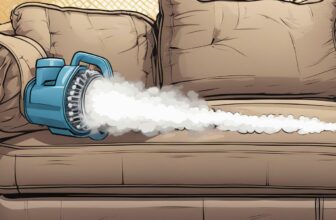
I know the importance of keeping cashmere garments looking their best. Cashmere is a luxurious fabric that requires gentle care, especially when it comes to stain removal. Nobody wants to ruin their favorite cashmere sweater or scarf with a stubborn stain!
In this article, I will provide an expert guide on how to get stains out of cashmere easily. From immediate actions to prevent stains from setting to advanced techniques for stubborn stains, I’ll cover it all. Whether it’s oil, ink, wine, or makeup, I’ve got you covered with step-by-step instructions and tips.
Key Takeaways:
- Stain removal for cashmere requires gentle yet effective techniques.
- Immediate action is crucial to prevent stains from setting in.
- Specific stains like oil, ink, wine, and makeup require tailored approaches.
- Preventive measures can protect cashmere from stains.
- Home remedies and dry cleaning are alternatives to spot cleaning.
- Cashmere maintenance tips can help prolong the life of garments.
Understanding Cashmere: A Delicate Luxury
As a professional copywriting journalist, I have had the opportunity to work with various luxury fabrics, and cashmere is undoubtedly one of the most exquisite materials available. Cashmere is a natural fiber that comes from the undercoat of the cashmere goat, a breed native to the Himalayas. It is known for its softness, warmth, and durability, making it a cherished and valuable fabric.
However, due to its delicate nature, cashmere requires special care and attention, especially when it comes to stain removal. Unlike other fabrics, cashmere cannot be washed in hot water, bleached, or put in a dryer, as this may cause irreparable damage. Therefore, it is crucial to handle cashmere with care and use gentle stain removal techniques that cater to the unique properties of this fabric.
Why is gentle care necessary for cashmere?
Cashmere fibers are finer and shorter than other natural fibers, such as wool, which makes them more prone to damage. Aggressive stain removal techniques or exposure to harsh chemicals can cause the fibers to break, leading to holes, pilling, or discoloration. Moreover, cashmere garments often come with an expensive price tag, making it essential to maintain their quality for as long as possible.
Throughout the rest of this article, I will provide you with a comprehensive guide on how to remove stains from cashmere effectively and safely. I will cover various methods for removing different types of stains, including natural remedies, general stain removal techniques, and advanced techniques for stubborn stains. I will also offer tips for preventing stains and general maintenance of cashmere garments.
Preparing for Stain Removal: Immediate Actions
Oh no, a stain on your beloved cashmere! Don’t panic, as fast action is key. Follow these easy methods to remove stains from cashmere:
- Blot, don’t rub: As soon as you notice a stain, use a white cloth or paper towel to blot the excess liquid or debris. Never rub the stain, as it can push it further into the fibers and cause damage.
- Avoid water: Water can damage the delicate fibers of cashmere, so don’t use it to remove stains. Instead, opt for dry cleaning methods or gentle cleaning solutions.
- Identify the stain: Before attempting any stain removal method, identify the type of stain. Different types of stains may require different treatment methods.
By following these best practices to remove stains from cashmere, you’ll increase the chances of successful stain removal without causing further damage to your garment.
General Stain Removal Techniques for Cashmere
When it comes to removing stains from cashmere, it’s crucial to use effective yet gentle methods. Here are some general stain removal techniques that can be applied to most types of stains:
| Method | Description |
|---|---|
| Mild detergent | Use a small amount of mild detergent mixed with water to spot-clean the area. Gently rub the stain with a soft cloth or sponge, and then rinse with clean water. |
| Vinegar solution | Mix equal parts white vinegar and water, and apply the solution to the stain with a soft cloth. Let it sit for a few minutes, and then blot with a clean cloth. |
| Enzyme-based cleaners | Apply an enzyme-based cleaner to the stain and allow it to sit for a few minutes. Gently work the cleaner into the fibers with a soft cloth, and then rinse with clean water. |
Remember to always test any cleaning solution on an inconspicuous area of the garment first, and avoid using any harsh chemicals or abrasive materials.
Spot Cleaning
Spot cleaning is a great way to target specific stains without having to clean the entire garment. To spot clean, simply apply the cleaning solution to the stained area and gently work it into the fibers with a soft cloth. Blot the area with a clean cloth to remove any excess moisture, and allow the garment to air dry.
Full Cleaning
If your cashmere garment is heavily soiled or has multiple stains, a full cleaning may be necessary. Always check the care label on the garment before attempting to clean it, and consider taking it to a professional cleaner if you’re unsure.
- Hand washing: Fill a basin with lukewarm water and add a small amount of mild detergent. Gently agitate the garment in the water, being careful not to rub or twist it. Rinse with clean water and gently press out any excess moisture. Roll the garment in a clean towel to remove additional moisture, and then lay it flat to dry.
- Dry cleaning: Take the garment to a professional cleaner who specializes in cashmere. Dry cleaning is a safe option for removing stains from cashmere, but it can be more expensive than hand washing.
With these general stain removal techniques, you can effectively remove stains from your cashmere garments without causing damage. Just remember to always be gentle and test any cleaning solution before applying it to the entire garment.
Removing Specific Stains from Cashmere
Stains can be particular to the type of substance that caused them. Here are step-by-step instructions for removing some of the most common and stubborn stains on cashmere:
Oil
For oil-based stains, apply cornstarch or talcum powder generously over the affected area. Gently rub it in with your fingers or a soft cloth and let it sit for several hours or overnight. Then brush off the powder and wash the garment per the instructions in Section 4.
Ink
For ink stains, carefully blot the excess ink with a clean, dry cloth. Then dab the affected area with a cotton ball soaked in rubbing alcohol or white vinegar until the stain begins to lift. Rinse with cool water and wash as usual.
Wine
If you spill wine on cashmere, blot the liquid with a clean cloth as soon as possible. Then mix a solution of equal parts water and white vinegar and apply it to the stain with a clean cloth. Rinse with cool water and wash as usual.
Makeup
To remove makeup stains, scrape off any excess product and apply a solution of water and mild detergent to the stain. Blot with a clean cloth until the stain begins to lift, then rinse with cool water and wash as usual.
Remember to always work on the stain from the outside in and avoid scrubbing or rubbing too hard.
Using these gentle stain removal techniques will help keep your cashmere looking its best for years to come.
Dealing with Stubborn Stains: Advanced Techniques
When it comes to tough stains on cashmere, sometimes the standard methods just won’t cut it. But fear not, there are advanced techniques that can help you remove even the most stubborn stains.
Hydrogen Peroxide
If you’re dealing with a tough stain like blood or wine, hydrogen peroxide can be your secret weapon. But be careful, as hydrogen peroxide can also bleach the fabric if not used correctly. Start by testing on an inconspicuous area and dilute the peroxide with equal parts water. Apply the solution to the stain with a clean cloth and let it sit for a few minutes. Blot with a clean cloth until the stain fades, then rinse with cold water and let air dry.
Baking Soda Paste
For oil-based stains like grease or makeup, a baking soda paste can work wonders. Mix equal parts baking soda and water to form a thick paste, then apply to the stain and let it sit for several hours or overnight. The baking soda will absorb the oil and lift the stain. Once dry, brush off the baking soda and rinse the area with cold water. Repeat as necessary until the stain is gone.
Professional Help
If all else fails, it may be time to seek professional help. Look for a dry cleaner that specializes in cashmere and has experience with tough stains. Be sure to point out the specific stain and the garment’s care instructions. While this may be more expensive than handling the stain yourself, it can be the best option for delicate cashmere garments.
Remember, always test any advanced technique on an inconspicuous area before applying it to the stain. With these methods, you can effectively remove even the toughest stains from your cashmere garments.
Preventing Stains: Tips for Cashmere Care
As much as we try to avoid it, accidents can happen, and stains on our cashmere garments can be a nightmare to deal with. Here are some quick tips to prevent stains from occurring in the first place:
- Apply a high-quality stain repellent to your cashmere garments before wearing them. This can help prevent stains from setting in.
- Avoid eating or drinking while wearing your cashmere garments, especially foods or beverages that are likely to stain, such as red wine or tomato sauce.
- Be cautious when applying perfume or makeup, as these products can also leave stains on your cashmere.
- If a spill or stain does occur, act quickly and follow the steps outlined in Section 3 to minimize the damage.
In addition to these preventive measures, there are also some general tips to care for your cashmere garments that can help maintain their quality and minimize the risk of stains:
- Store your cashmere garments folded, rather than hanging, to prevent stretching and distortion.
- Keep your cashmere away from direct sunlight and heat, as this can cause fading and damage to the fibers.
- Wash your cashmere garments infrequently, using a gentle detergent and cold water. Avoid using fabric softener, as this can damage the fibers and reduce the effectiveness of the stain repellent.
- Allow your cashmere garments to air dry flat, rather than tumble drying or hanging them up to dry. This will help maintain their shape and prevent stretching.
By following these tips, you can help keep your cashmere looking its best and minimize the risk of stains, but accidents can still happen. In the next section, we’ll explore the pros and cons of dry cleaning your cashmere, and in Section 9, we’ll provide some natural remedies for those tough stains.
Dry Cleaning Cashmere: Pros and Cons
When it comes to removing stains from cashmere, dry cleaning is often seen as a safe bet. But is it always the best option?
First, let’s look at the pros of dry cleaning cashmere:
- Professional cleaners are trained to handle delicate fabrics like cashmere and use specialized equipment to ensure a thorough clean.
- Dry cleaning can help to remove tough stains that can’t be removed with home remedies.
- It’s a time-efficient option – you can drop off your garment and pick it up looking like new.
However, there are also some cons to dry cleaning cashmere:
- It can be expensive, particularly for larger items like coats or blankets.
- Some dry cleaning chemicals can be harsh and may damage the fibers of your cashmere, leading to wear and tear over time.
- Repeated dry cleaning can cause cashmere to lose its softness and shape.
Ultimately, whether to dry clean your cashmere will depend on the severity of the stain and the item in question. For small, mild stains, a gentle home remedy may be a more cost-effective and safe option. However, for larger or more stubborn stains, or for particularly valuable or delicate garments, it’s best to seek professional help.
Home Remedies: Natural Solutions for Stain Removal
When it comes to removing stains from cashmere, natural remedies can be effective and gentle. Here are some easy methods to remove stains from cashmere.
Lemon Juice
If you have a tough stain on your cashmere, lemon juice can help. Simply pour a small amount of lemon juice onto the stain and let it sit for a few minutes. Then, gently blot the stain with a clean cloth and rinse with cool water. Repeat as necessary.
Baking Soda
Baking soda is another natural solution for removing stains from cashmere. Mix a small amount of baking soda with water to create a paste, then apply the paste to the stain. Let it sit for at least 30 minutes, then gently brush it off with a soft-bristled brush. Rinse with cool water and repeat as necessary.
Baby Shampoo
If you have a delicate stain on your cashmere, such as makeup or oil, baby shampoo can help. Mix a small amount of baby shampoo with water to create a gentle cleaning solution. Apply the solution to the stain and let it sit for a few minutes. Gently blot the stain with a clean cloth and rinse with cool water. Repeat as necessary.
Remember, when using any natural remedy on your cashmere, it’s important to test it on a small, inconspicuous area first to ensure it doesn’t cause damage. With gentle stain removal and proper care, your cashmere garments can maintain their elegance and luxury for years to come.
Spot Cleaning vs. Full Cleaning: When to Choose
When it comes to cleaning your cashmere garments, it’s important to understand the difference between spot cleaning and full cleaning, and when to choose each method. Spot cleaning is a quick and easy way to remove small stains or spots from your cashmere, while full cleaning involves washing the entire garment to remove dirt and odors.
If the stain on your cashmere is small and fresh, spot cleaning is probably the best option. Blot the stain with a clean cloth, and then apply a solution of equal parts water and white vinegar to the area. Blot again with a clean cloth until the stain is gone. For tougher stains, you might need to use a stain remover specifically designed for cashmere, or seek professional help.
On the other hand, if your cashmere garment is dirty or has a lingering odor, full cleaning may be necessary. However, be cautious as washing cashmere can damage the fibers and cause shrinking. If you decide to wash your cashmere, do so by hand in cool water with a mild detergent specifically designed for delicates. Never wring or twist the garment, and always lay it flat to dry.
Ultimately, the decision between spot cleaning and full cleaning will depend on the severity of the stain or dirt, and the instructions on the care label of your cashmere garment. It’s always better to err on the side of caution and seek professional help if you’re unsure.
Caring for Cashmere: Maintenance Tips
Now that you know how to remove stains from your cashmere garments, it’s important to maintain their quality to prevent future stains. Here are some gentle stain removal tips for cashmere and quick tips for stain removal from cashmere:
- Always follow the care label instructions: Cashmere requires delicate care, so be sure to follow the care label instructions for washing and drying. Avoid using hot water and harsh detergents, and opt for gentle, wool-specific detergents instead.
- Store your cashmere garments properly: Cashmere should be stored folded, not hung, to prevent stretching. Keep your garments in a cool, dry place, away from sunlight and moisture.
- Avoid contact with potentially staining substances: Be cautious when wearing your cashmere garments around substances that can stain, such as makeup, oils, and wine. If a spill occurs, follow the tips in section 3 immediately.
- Spot clean stains as soon as possible: For small, fresh stains, spot cleaning may be all that’s necessary. Follow the tips in section 4 for general stain removal techniques and section 5 for specific stain removal.
- Don’t toss your cashmere garments in the washing machine: Cashmere should be hand-washed or dry cleaned to maintain its quality.
By following these simple care tips, you can help prolong the life of your cashmere garments and reduce the risk of future stains.
Conclusion
Well done! You’ve learned how to get stains out of cashmere and how to care for your luxurious garments properly. Remember, cashmere requires gentle treatment, so always avoid harsh chemicals or rubbing. Instead, use the techniques I’ve provided, starting with immediate blotting and moving on to general or specific stain removal methods as needed.
If a stain proves stubborn, try advanced techniques like hydrogen peroxide or baking soda paste, but always test them first. And, of course, prevention is always the best cure. Take simple steps like using stain repellents and proper storage to minimize the risk of stains.
Caring for your cashmere shouldn’t be a chore but a pleasure. By following the advice in this article, you’ll keep your garments looking and feeling their best. Thanks for reading, and happy stain-free cashmere wearing!
FAQ
Q: Are the stain removal techniques safe for all types of cashmere?
A: Yes, the stain removal techniques provided in this article are safe for most types of cashmere. However, it is always recommended to test the method on a small, inconspicuous area first to ensure it does not damage or discolor the fabric.
Q: Can I use water to remove stains from cashmere?
A: It is generally recommended to avoid using water directly on cashmere to remove stains, as it can cause the fabric to shrink or stretch. Instead, opt for dry stain removal techniques outlined in this article.
Q: How do I remove oil stains from cashmere?
A: To remove oil stains from cashmere, gently blot the stain with a clean cloth or paper towel to absorb as much oil as possible. Then, sprinkle talcum powder or cornstarch on the stain and let it sit overnight. Brush off the powder and repeat if necessary.
Q: Can I use bleach to remove stains from cashmere?
A: No, bleach should not be used to remove stains from cashmere. Bleach can weaken the fibers and cause discoloration. Stick to the gentle stain removal techniques mentioned in this article.
Q: What should I do if the stain doesn’t come out after trying these methods?
A: If the stain persists after attempting the recommended stain removal techniques, it is best to consult a professional cleaner who specializes in cashmere. They will have the expertise and tools necessary to safely remove stubborn stains.





